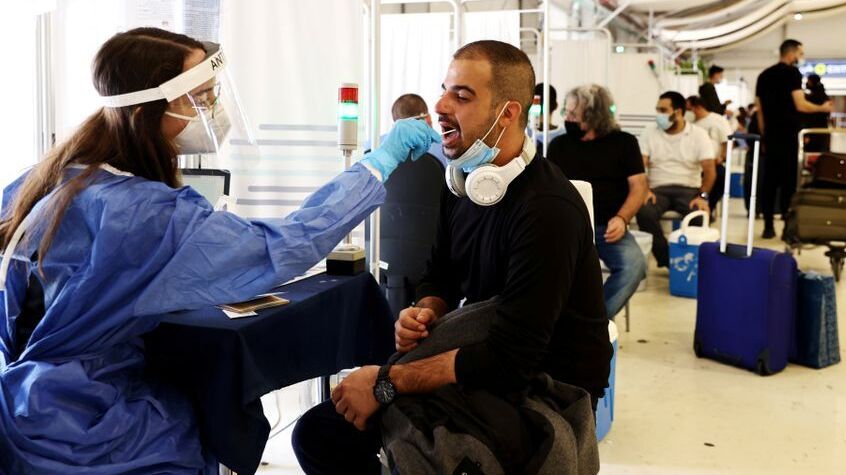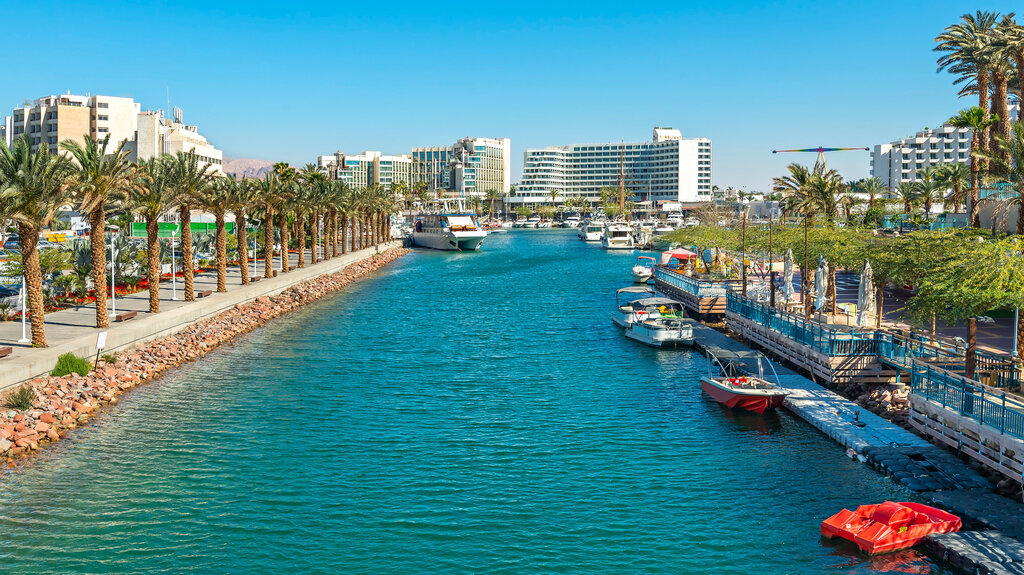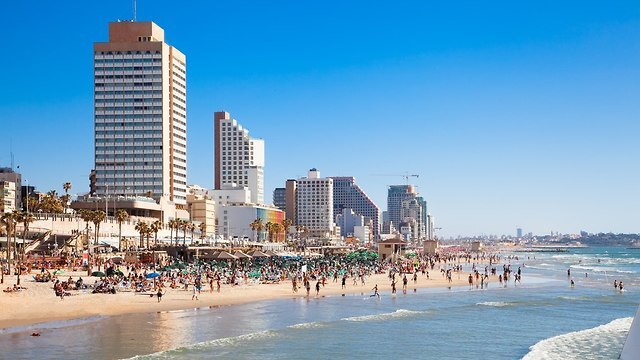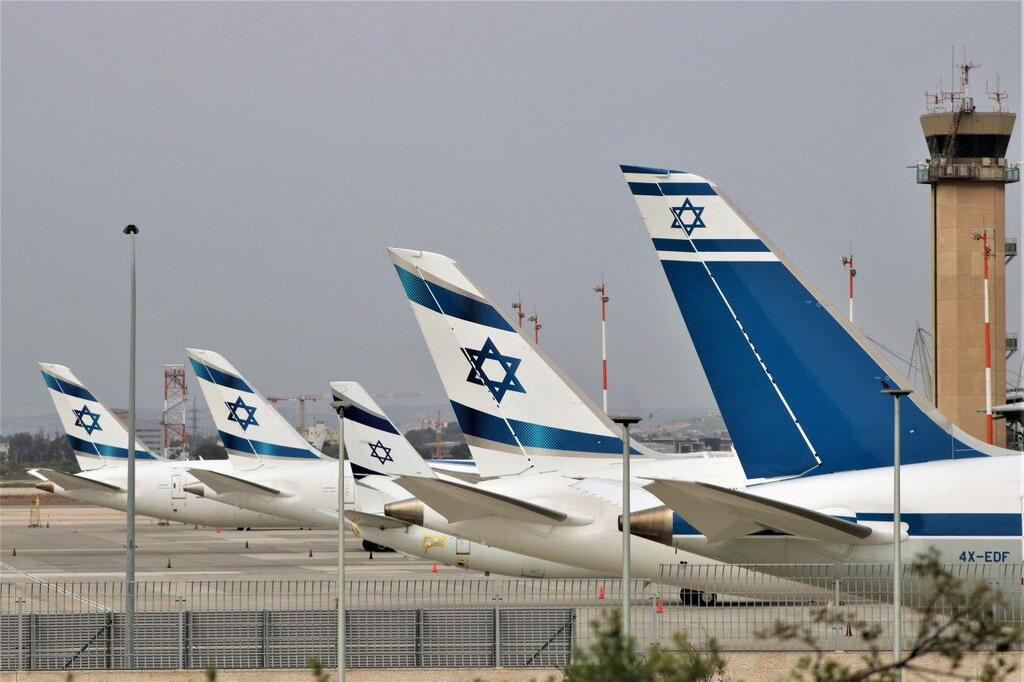With the guidelines allowing international vaccinated tourists fully in effect, Israeli officials have said they expect an influx of travelers from all over the world, but those in the country's tourism sector claim the industry will not be revived so easily.
The Tourism Ministry said earlier this week that with the reopening of Israel’s skies on November 1 to vaccinated travelers, up to 100,000 people are expected to arrive in the first few weeks.
4 View gallery


A healthcare worker takes a swab sample from a traveller for a coronavirus disease (COVID-19) test at the Ben Gurion International Airport
(Photo: Reuters)
However, tour guides say that it will take time for tourism to ramp up given there are still strict limitations on who can enter the country. In addition, Prime Minister Naftali Bennett and Health Minister Nitzan Horowitz greenlit the policy on October 21, but it only received official government approval the following week.
“Let's see how many travelers will actually come. My network of tourists waiting to come is hesitant and afraid of uneasy procedures,” licensed tour guide specializing in biblical tours of the West Bank, Aryel Tsion said. “Most people do not plan an Israel trip in the short term, they book at least a few months in advance.” The consensus from tour guides is that mid-December or the end of this year is when Israel will see more foreigners landing at Ben Gurion Airport.
At least one tour guide predicts an even later date for business to pick up again. "I hope the situation will improve, but I don’t think I will be back to my career of guiding until spring. Would love to be proven wrong, I miss guiding and showing people this amazing country," tour guide Hannah Rosenberg said.
The Jewish state had planned to allow individual vaccinated visitors this summer and to add a pilot program later, allowing groups in, but authorities delayed reopening the borders due to a spike in coronavirus cases driven by the highly contagious Delta variant.
In the past weeks, the fourth wave of the coronavirus has ebbed. According to Health Ministry data, the number of daily cases dropped below a thousand and the positive test rate is under one percent. Meanwhile, nearly four million Israelis have been jabbed with the vaccine booster shot.
Still, Israel is being cautious to allow individual vaccinated visitors into the country - too cautious according to some in the tourism industry. Under the new rules, individual visitors either must be fully vaccinated within the previous six months, recovered from COVID within the same timeframe, or recover from the disease before May 1 followed by at least one vaccine dose.
In order to enter Israel, a digital recovery certificate is required. The U.S. doesn't currently have a program for digital recovery certificates, and a total of 44 countries are participating in the European Union's Digital COVID Certificate program and will be eligible for entry.
Anyone jabbed with vaccines approved by the World Health Organization are eligible for entry into the country. Among the vaccines are Pfizer, Moderna, Johnson & Johnson, AstraZeneca, Covishield, Sinovak, and Sinopharm. Israel will also recognize Russia's Sputnik V vaccine from November 15, given the visitors will perform a serological test, while the other vaccines currently require PCR testing upon arrival.
Travelers can only enter the country through Ben Gurion Airport and not through other border crossings such as Jordan and Egypt. "The orderly procedure will encourage the arrival of the tourists, we are very grateful and happy, and look forward to seeing tourists," said the general director of the Israel Hotels Association, Oded Grofman.
However, Grofman pointed out that Israel's entry requirements are much stricter compared to other countries and that many families will not be able to visit the Jewish state because their children have no way of getting vaccinated under the current regulations.
The interview with Grofman took place shortly before the U.S. Food and Drug Administration (FDA) on Friday authorized Pfizer's COVID vaccine for children ages 5 to 11 following a recommendation by a panel of experts advising the U.S. regulatory agency.
All travelers must take a PCR test 72 hours or less before boarding their flight and upon arrival at the airport. "We hope this decision after a month or two will be less strict. We believe that you can still maintain a high level of safety without so many restrictions," Grofman said.
According to Grofman, Tel Aviv and Jerusalem were particularly hard hit by the border closure, since some 80 percent of tourists visiting the two Israeli cities come from abroad, and as of now, 20 hotels are still closed in both places.
Tourism in Israel dropped 80 percent last year after reaching a record high of 4.55 million visitors in 2019 that contributed $7.2 billion to the economy. "I have been extremely disappointed in the government’s failure to act in line with other Western countries to prioritize tourism and to find safe ways for tourism to happen in a timely manner," said founder and owner of Israel-based Pomegranate Travel, Hannah Blustin.
Blustin said that the tourism industry needs more certainty that the new entry policy will be sustainable in the long term and move toward being less restrictive rather than more so. She said that the government caused financial damage to tour companies in the summer when they reversed the decision to open the border to individual visitors.
Still, Blustin said that they have been "absolutely inundated with inquiries" since the announcement. "This is the first good news we’ve had since March 2020 and I hope that it shows a new direction that the government is taking and a new appreciation of the economics and wider importance of tourism to Israel."




